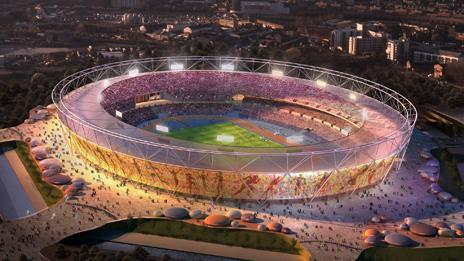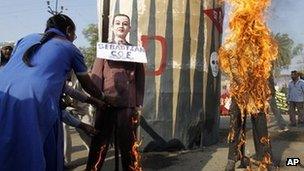London 2012: How does Dow Chemical gain from Olympics?
- Published

Dow has paid £7m for the 900m stadium wrap, but amid increasing uproar over its involvement said its branding will not appear on the fabric
What has Dow Chemical got to gain from sponsoring the Olympics?
The world's second-largest chemical manufacturer became one of the 11 Worldwide Olympic Partners in 2010 in a multi-million pound deal which lasts until 2020.
The resulting publicity has been almost entirely negative.
Almost every story written about Dow's sponsorship namechecks its association with the 1984 Bhopal chemical leak - one of the world's worst industrial disasters.
Rights groups, athletes and Indian and British politicians have spoken out against Dow, thousands have signed petitions condemning it, effigies have been burnt, and the company has paid £7m to fund a fabric wrap around the stadium that won't even carry its logo.
But despite the negative coverage, the firm is adamant it will not give up the 10-year tier one deal.
'Show me the money'
George Hamilton, the American firm's Vice-President for Dow Olympic Operations, says reputation is important.
And using the Olympics as a platform to talk about what Dow wants to talk about - what chemistry brings to the world in terms of supplying solutions in the field of water transportation, agriculture and energy - is a good way to bolster that reputation.
Similarly, involvement with the Olympics is good for employee morale for a firm focused on business-to-business relationships.
Dow's 50,000 global staff have been involved in contests to run in the torch relay and design the company's London 2012 pin badge.
But the bottom line from the company board's point of view is, as Mr Hamilton put it: "Show me the money."
During the 10 years of Dow's Olympic sponsorship, he estimates there will be £97bn ($150bn) spent on Olympic Games - building stadiums, venues, athletes' villages, roads and bridges, making a big marketing opportunity for a company ubiquitous in the field.
And, as Mr Hamilton says, the Games would not be the same without Dow.
From its urethane foam in the track, polymer fibres in the super-fast hockey pitches, materials in walls, floors and roofs of stadia and insulation technology in the broadcast and electricity wiring cables to technology in the signage in the controversial Games Lanes, the company's hands are all over London 2012.
But with 750 employees and 12 sites in the UK, the company is well established here.
Its commercial focus is looking ahead two years to the Winter Games in the Russian city of Sochi and the Youth Olympic Games in China's Nanjing and two years after that to the Rio 2016 Olympics.
"We're well known in US and Western Europe, but our profile is not that high in growth economies like Brazil, China and India," Mr Hamilton told the BBC.
Russia is projected to spend more than a trillion dollars to rebuild its infrastructure in the next 20 years, analysts suggest, with Brazil predicted to spend somewhere in the region of $500-700bn.
"On the commercial stage, Brazil, Russia and China are more important than London," said Mr Hamilton.
"This becomes a great entry point for us in those countries to accelerate our engagement to get a return not only from Olympics Games investment, but the legacy from that."
'Not being bullied'
On the controversy surrounding Bhopal, the man from Dow Chemical accepts that it may not be possible to put the issue to bed.
In 1999, Dow merged with the Union Carbide Corporation, whose subsidiary Union Carbide India ran the Bhopal pesticide plant - the site of one of the world's worst industrial disasters in December 1984.

Bhopal protesters burned an effigy of Lord Coe on the 27th anniversary of the disaster
Campaigners say the chemical gas leak and its fallout have killed 25,000 people, and that local people continue to be affected.
Dow has said Union Carbide's £288m settlement for those affected by the tragedy - which was paid in 1989 - is fair and final.
It says the Indian government was directed to take out an insurance policy to cover any further claims and that from 1998 it undertook responsibility to clean up the now abandoned site, which environmentalists say is still poisonous.
But in 2010 the Indian attorney general's office filed a case to the Supreme Court seeking to more than double to £700m the compensation paid, suggesting the Indian government had been duped when it agreed the terms of the 1989 settlement with Union Carbide.
"It's very curious when you look at the facts and look at the timeline that here we are today with people trying to put a liability on Dow - it just doesn't add up," said Mr Hamilton.
And he is adamant Dow will not withdraw its sponsorship, adding: "We're not going to let someone bully us into taking responsibility for something that is not our issue."
Toxic association
For Mr Hamilton, the approval of Olympics bigwigs like Jacques Rogge and Sebastian Coe is more important.
London 2012 chairman Lord Coe has previously defended Dow's role, saying he was satisfied "that at no time did Dow operate, own or were involved with the plant either at the time of the [1984] disaster or crucially at the time of the full and final settlement".
Mr Hamilton explained: "Those people don't get involved unless they've done their due diligence and see that we can contribute to the Olympic ideal."
In November, India's Olympic Association said there was "no question" of a boycott of the Games amid the furore over Dow's involvement.
Even so, as long as politicians, athletes and celebrities - both in India and elsewhere - continue to speak out on the issue, Dow will be associated with the Bhopal disaster.
IOA acting president VK Malhotra said last month Dow should be removed as sponsors of the Games, saying it was not true that Bhopal victims had been paid final compensation.
In a letter to IOC President Jacques Rogge, Mr Malhotra said: "A false campaign has been launched by the Dow Chemical saying that matter has been settled. It is not correct. The case is still pending in the court and no final compensation has been made."
Dow's logo may not be appearing on the 900m Olympic Stadium wrap, but the company's name will continue to be associated with the controversy.
- Published23 January 2012
- Published5 December 2011
- Published2 December 2011
- Published28 November 2011
- Published15 November 2011
- Published8 August 2011
- Published4 August 2011
- Published8 February 2011